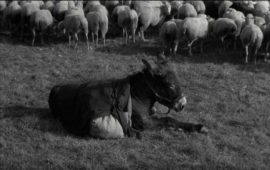Episode 2 – Fien Troch
Fien Troch, one of Belgium’s most highly praised directors, takes the baton from Gust Van den Berghe and allows Photogénie and its readers a glimpse into her deepest cinephiliac thoughts, laying bare her tears for a dead donkey. After a few short films, Troch hit the Belgian scene with her debut feature Een Ander Zijn Geluk (Someone Else’s Happiness) in 2005, carefully deconstructing the aftermath of a child’s death by a hit-and-run accident in a small Flemish town. The film plays out both as a literal and existential whodunit, with characters struggling to communicate and Troch emphasizing the banality of grief in daily life, subtly incorporating her characteristic moments of understated humor. She amplified both content and form for her follow-up feature, Unspoken (2008), choosing a handheld camera over tracking shots to stick close to protagonists Lukas (Bruno Todeschini) and Grace (Emmanuelle Devos). Echoing Lodge Kerrigan’s claustrophobically intense Keane (2004) – featuring a magnificent Damian Lewis – Troch gets under the skin of a couple dealing with the disappearance of their fourteen-year-old daughter five years after the facts. Once again, Troch’s focus on the impossibility of communication following personal trauma provides for a fascinating in-depth character study, especially when both characters start to be confronted with afterimages of their lost daughter. For her third and most current film, Kid (2012), the director chose to switch focal point and tell her story mostly from a child’s perspective, the eponymous seven-year-old Kid (Bent Simons). Abandoned by their father, he and his brother Billy (Maarten Meeusen) live on a debt-ridden farm with their desperate mother (Gabriela Carrizo) in a smotheringly suburban Flemish village, before being forced to move in with their colorless aunt and uncle. Troch arrested her frame for Kid, opting for carefully composed static pictures that give the viewer time to take in the elliptical narrative. She does this by symmetrically framing icons of (Belgian) suburban domesticity such as porcelain figurines, carefully manicured front lawns, tasteless art, and too tidy houses, like a subdued New Topographics version of David Lynch would, allowing scenes to unfurl slowly in the frame to highlight the often absurdly banal and surreal feel of the film – look out, for instance, for a supermarket parking lot scene with a tuned car and the inherently Belgian Bonzai Records music. The apathetic behavior of most protagonists gives the film a Bressonian touch at times, but Troch’s sense of humor pervades throughout, imbuing expressionless close-ups with laughter in their length or framing, providing sporadic bursts of action through the antics of Kid and his friends, and also genuinely tugging at viewers’ heart strings. Fien Troch is currently hard at work on her fourth feature film, the content of which remains top secret.
Moment
Au hasard Balthazar (Robert Bresson, 1966)

Balthazar is tired, he’s used up and wants to lie down. A herd of sheep surrounds him and we hear the clinging of their bells. And then they let him be for a while and Schubert‘s music starts. And it’s like all the sadness, beauty and pain of mankind comes together in this one beautiful moment. It never gets sentimental, the music stops, Balthazar dies and the sheep continue to do their thing. It so made me cry when I was a kid and it still does now. That sweet beautiful donkey stole my heart forever.